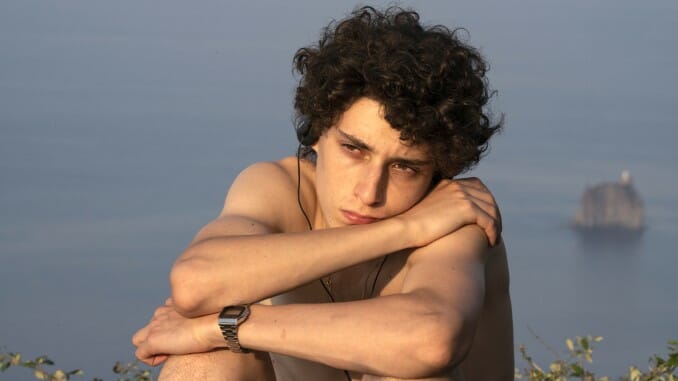The Hand of God, The Eyes of a Boy

Paolo Sorrentino bookends his new coming-of-age opus, The Hand of God, with divine representation, and spends every moment in between grousing over life’s endless parade of disappointment. Humanity is dreadful. Everything is a failure. Reality is lousy. “What a shitty world this is,” one woman opines around 45 minutes into the movie. “You go buy dessert and when you get back, your husband’s in jail.” The details are irrelevant. It’s the sentiment that lands.
The dialogue reads like Sorrentino soliloquizing via his characters, airing grievance after grievance about the grounding effect of The Hand of God’s story on its plot: Set in 1980s Naples, attending to the rich, boring routine comprising the comings and going of the tight-knit family Schisa—father Saverio (Toni Servillo) and mother Maria (Teresa Saponangelo), and their sons, eldest Marchino (Marlon Joubert) and youngest Fabietto (Filippo Scotti)—Sorrentino constructs the film with fewer surrealist flourishes than in his latter-day works, a la 2018’s Loro, 2015’s Youth and 2013’s The Great Beauty, where a man makes a giraffe disappear into thin air in the middle of a Roman colosseum. Placed next to these pictures, The Hand of God is downright normal.
Normalcy may not satisfy Sorrentino’s characters, whether principle or supporting, but The Hand of God finds abundance in quotidian Italian conventions: Abundance of meaning, abundance of beauty, abundance of comedy, and so as to avoid burying the lede, The Hand of God is consistently hilarious for the first hour or so (an opening scene of domestic violence notwithstanding). No sooner have 20 minutes elapsed that the Schisas have gathered beneath an arbor for a vast lunch where the main course is a ceaseless stream of insults, goading and unadorned mean-spirited remarks. Maria hovers by the family matriarch, Signora Gentile (Dora Romano), a harridan with a hair-trigger temper, gamely trying to push the Signora to curse. Curse she does. Either the Signora has zero patience or Maria’s just that good.
Comedy punctuates The Hand of God’s placid narrative, witnessed almost solely through the eyes of Fabietto. Sorrentino’s teenage protagonist sees all and feels more, as if the director means to say that the gift of observation is actually more of a bane. Life in house Schisa for the most part is pleasant, loving, warm; the idyll cracks when Saverio’s long-time mistress calls Maria late in the evening to taunt her. (Ah, extramarital affairs, Italian-style.) Maria kicks Saverio out. She starts juggling oranges, a beloved parlor trick at family functions, to calm her anguish. Fabietto has a seizure. It’s a lot. But in darkness Sorrentino looks for light. Brotherly love prevails: Marchino rushes to Fabietto’s rescue, reminding him of the good things in life, like Diego Maradona, the Argentine soccer star who led the Napoli soccer club to its first championship in the 1986-1987 season; and of Patrizia (Luisa Ranieri), their hot aunt, who walks around naked in roughly one-third of her screen time.
-

-

-

-

-

-

-

-

-

-

-

-

-

-

-

-

-

-

-

-

-

-

-

-

-

-

-

-

-

-

-

-

-

-

-

-

-

-

-

-








































